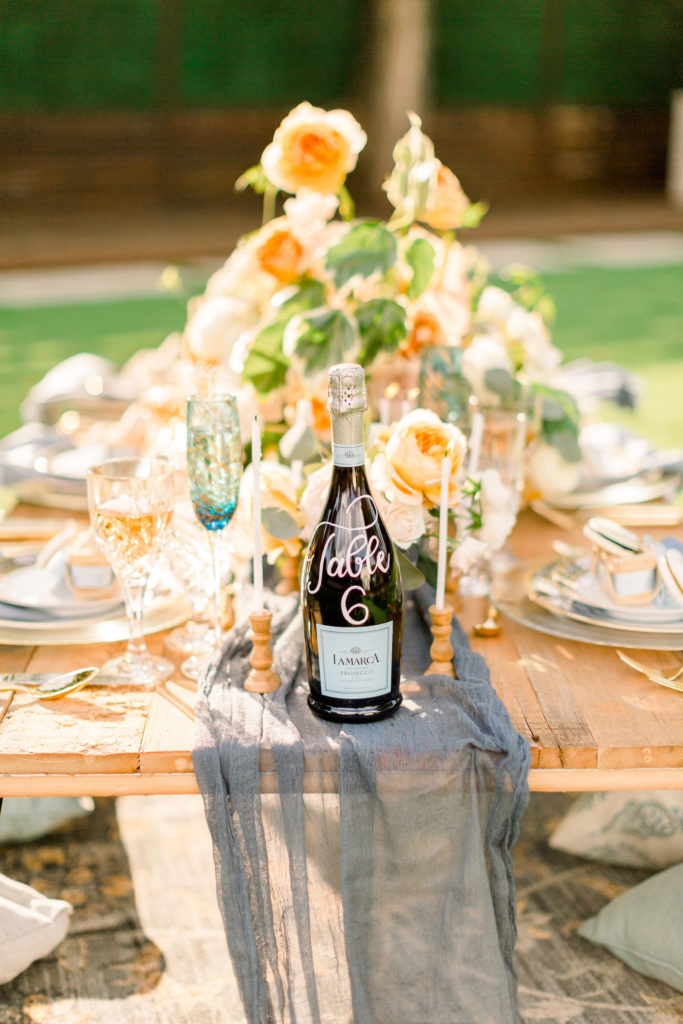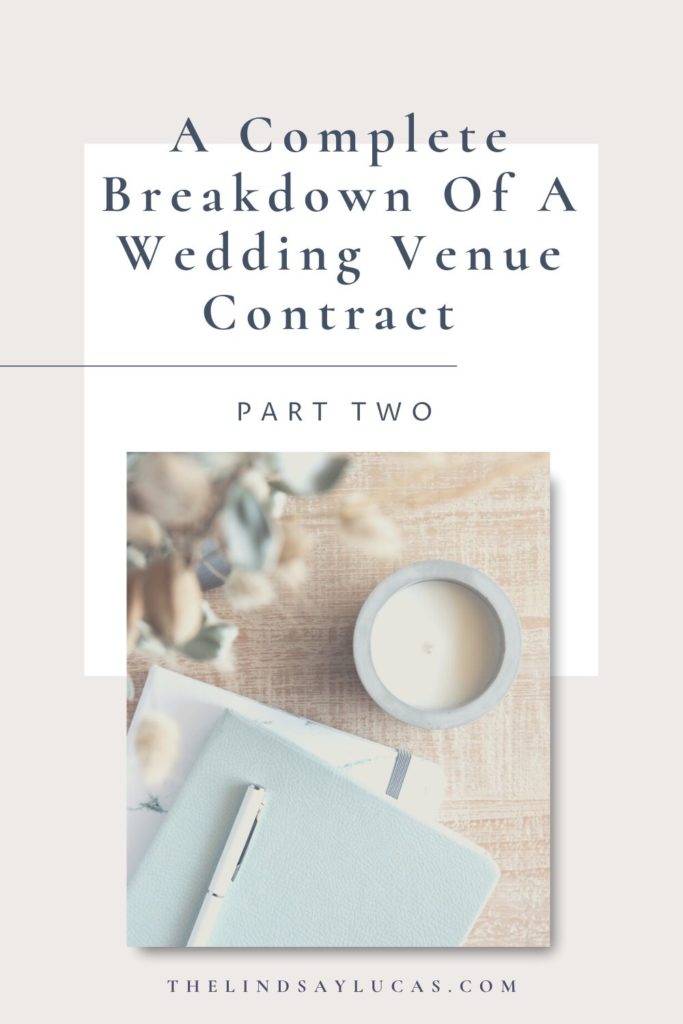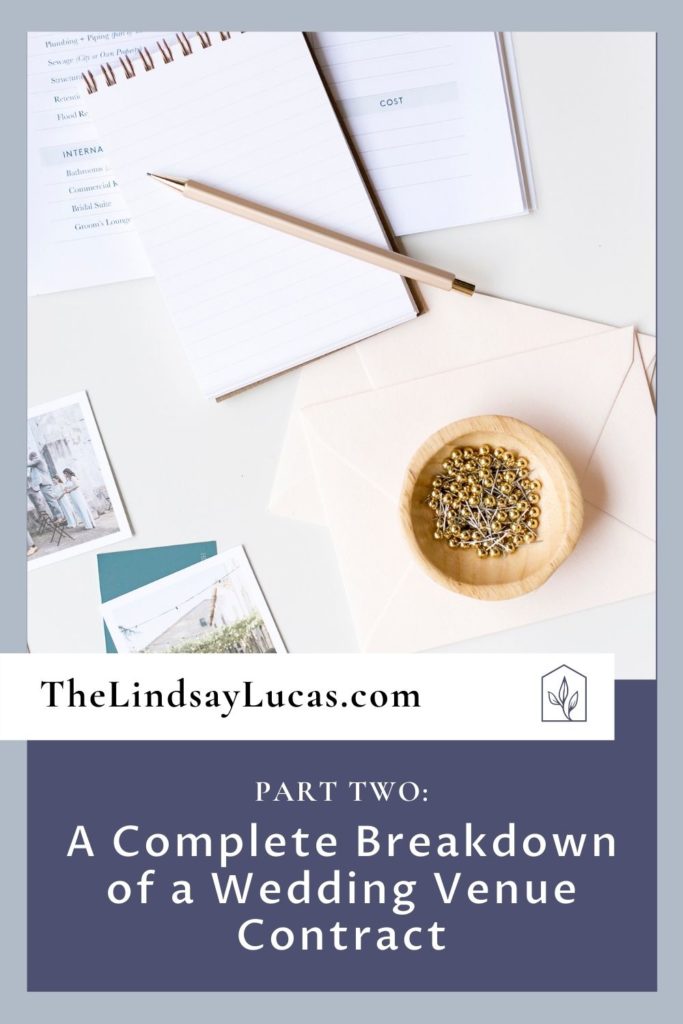A Complete Breakdown of a Wedding Venue Contract – Part II
If you haven’t read the first part of the complete breakdown of a wedding venue contract, stop reading this and go back and read part one first: A Complete Breakdown of a Wedding Venue Contract – Part I. You’re going to want to have read it because part two dives right in and I don’t want you feeling lost! Today, I’m talking all about wedding venue contracts and I’m breaking it down into bite-sized pieces. Okay, let’s jump back in where we left off:
What goes into a wedding venue contract?
Section Seven: Alcohol Policy
If alcohol is being served at your venue, you’re probably going to get some interesting situations. This is why you need an alcohol policy in your wedding venue contract. If you don’t have an in-house liquor policy, a few of these things will be different. For my business, clients are required to choose from our list of professional bartenders; they can’t hire anyone else. Also, all alcoholic beverages and alcohol services must be provided by the Professional Bartending Company. Self-serve alcohol of any kind is not permitted and this is stated in the wedding venue contract. Outside alcohol, personal alcohol, and self-serve alcohol is strictly prohibited. In my wedding venue contract, it states that I don’t allow shots past 8 pm. It also states that I reserve the right to cut off any wedding guest from the bar.
Professional Bartenders
I only work with professional bartending companies that I know and have worked with in the past. This helps me feel comfortable because I know that they do a great job – they check IDs, they’ll cut people off, but it’s also up to me because I’m the owner of my building. Even though I have professional bartenders, it’s my right to cut off guests as well. It’s your right as a venue owner. You have to protect your wedding venue.
Many of my clients choose to have event security when there is alcohol being served. This is a precaution in case there are situations where security is needed so that the venue owner doesn’t have that responsibility.
Bar Service
I allow full bar service after the ceremony only. I don’t do full bar service pre-ceremony. My couples can do a pre-ceremony drink – that’s totally fine. But the bar is closed until after the ceremony. I don’t allow additional alcohol to be brought onto the property after the ceremony start time. Also, in the wedding venue contract, it states that you can’t run out to get more alcohol after the ceremony unless the alcohol runs out completely. The wedding venue contract also says that violators of any of the alcohol policies will be asked and required to leave the property immediately by a member of my staff. If they don’t leave, we will call local authorities. The wedding venue contract says that I also reserve the right to shut down any wedding where alcohol has played a factor and things aren’t going well.
Section Eight: Rules and Policies
You should have a separate document with this outside of the wedding venue contract. The reason being is that not only does it tend to be more pleasing to the eye, but it’s just another way to communicate. As venue owners, we should be overcommunicating to our clients because it’s our job. These rules and policies are super important to communicate inside and outside of your wedding venue contract. Put them on a FAQ page and make it easy for people to find them.


Vendors
In my wedding venue contract, it states that all vendor contact information needs to be submitted via our client vendor questionnaire no later than 30 days from the client’s wedding date. This is so that I can reach out to all of their vendors before the date. We provide a full vendor list, but (unlike with the bartenders) this is just to give our clients a list of people we have worked with in the past and they aren’t required to hire from the list.
I do require a professional catering company that has insurance and is able to serve in our state. Providing homemade food is not allowed. The wedding venue contract says that the lessor is responsible for setup, breakdown, and replacing all tables and chairs to the storage area, and a final cleanup of the venue at the end of the rental period. I, as the lessor, take care of this for my clients!
There are some crucial things you can do as a venue owner to make working with vendors really easy – check out this list of 13 things vendors will thank you for.
Open Flames and Decor
The wedding venue contract states that I don’t allow cooking with an open flame in the venue. This is a personal choice. I also don’t allow fireworks like sparklers because of fire restrictions. All catering companies have to be self-contained with hot boxes in their kitchen trailers. All decorations must be approved by me. I say this in the wedding venue contract because I want my clients to know that I need to know exactly what they’re bringing into my building. I don’t want anything that’s vulgar or permanent so everything has to be approved by me. The wedding venue contract also says what decor is not allowed: tape, nails, staples, etc. I allow candles, but they have to be contained in vases.
This is a lot, you guys. Bear with me, because it’s all important stuff! I’m not going to go through everything that’s in this section of the wedding venue contract because it’s so much. You’ll come up with your own rules and policies regarding things like silly string, glitter, fake flower petals, pets, etc. I have very specific rules for my venue and the same will go for you!
Children
The wedding venue contract states that children under 16-years-old must be under adult supervision. I put this in here because I don’t want toddlers walking around by themselves. We’re not babysitters. I need minors to be supervised.
The wedding venue contract also states that all illegal substances are not permitted.
Personal belongings of the leasee need to be removed at the end of the event and I don’t take responsibility for their stuff. Also, cars cannot be parked at the venue overnight.
Pets
The pet portion of my wedding venue contract states that I have to meet the pet first before it’s approved to be present at the event. Also, it has to be on a leash at all times, it has to have a pet handler, and it has to be removed from the property after the ceremony. It can’t be crated or tied up on a leash on my property. Some venue owners state in the wedding venue contract that they prefer to have documentation provided that shows the animal is up to date on all vaccinations – that’s a personal preference.
At the end of this section of the wedding venue contract, it says that my venue has the right to enforce these rules at any time. It’s basically saying that I have rules and I reserve the right to enforce them and, if need be, I will.
How you want to deliver these rules and regulations in the wedding venue contract will be up to you. Some venue owners want their clients to initial after every policy and procedure. Others just want a simple separate document where their clients can reference it. I have a client whose policies and procedures are just loose guidelines. Truly, it’s whatever you feel comfortable with and that might change over time as long as your couples are made aware of what your policies actually are.
Section Nine: Insurance
I require our clients to obtain special event insurance and I need their insurance documents 30 days before their wedding. I also require all professional vendors to obtain liability insurance and provide me with that document.
Section Ten: Cancellation and date-change policy
In my wedding venue contract, I have a 15-day grace period where they can cancel and get their money back prior to 15 days after they book, apart from the retainer fee. After the 15 days, all of their payments are non-refundable. I’m not a collections agency – that’s not what I’m trying to do, but I’m definitely going to get paid for the work I’ve done.


The date change policy in my wedding venue contract says that if your wedding date is 8 months out or less, and you need to change your date, I’m going to keep all money paid up to that point and you need to pay a $1000 date change fee.
Of course, we’ve all had to be far more flexible in recent years as a result of the Covid-19 pandemic, so if you’re wondering how to protect your business while still delivering great experiences for your clients, take a look at my Covid Bundle for Venues.
Improvement Clause
I also have an “improvement clause” in my wedding venue contract. Why? Because I do a lot of updates to my venue and I keep it in pristine condition. The main reason I have this clause in my wedding venue contract is that I do a lot of updates and I don’t want to check in with a client every time I do. I’m not going to make crazy changes, but if I want to add a patio or put in more sod, I don’t want to have to tell all my clients every time.
For example, if a bride tours the venue and you have these gorgeous whitewashed floors and, due to wear and tear, you have to replace your floors. But then she comes for her final walkthrough and doesn’t like your new floors. With the improvement clause, you’re protected against those scenarios. That being said, if I’m going to make a big improvement to my venue, I am going to communicate that to my clients.
A good tip is to keep your clients informed and involved in the decision-making process even though you’ll obviously have the final say. Send out a poll asking them what kind of floors or light fixtures they like better so they feel involved in the process!
Section Eleven: Non-customizable stuff
This part of the wedding venue contract talks about assignment and sub-licensing. This means that no subleasing is allowed. For example, let’s say a bride wants to find a replacement for her wedding date and get her money back. This part of the wedding venue contract protects against that. It also states that a client can’t assign the contract to another interested party. This essentially means that someone else can’t insert themselves into the contract and that they’re prohibited from contacting you.
Termination Clause
This section of the wedding venue contract is about the lessor, which means us as the venue owners. This says that we have the right to cancel a client’s wedding if they don’t make their payments or provide us with their insurance. This section goes through all of the ways a venue owner can terminate a wedding without any recourse. I’ve never had to use this part of my wedding venue contract in small claims court, so don’t think this contract is the end all be all. Always talk to an attorney.
Interference Clause
This is another way to say that the lessee shall use the venue in a manner that shall not cause interference with the use or occupancy of the use of the other portions of the venue in any way. Basically, they need to use the property as a wedding venue and that’s it – they can’t abuse the wedding venue by turning it into a rave or roll in all of their motorcycles into the venue. They have to use the venue in the way I’ve stated and it can’t turn into something else.
Restoration Clause
This part of the wedding venue contract says that if damage occurs to my venue or if repairs or replacements need to be made as a result of the lessee, the lessee will pay for it from the damage deposit or the special event insurance.
Uncontrollable Circumstances
This section of the wedding venue contract says that I am not liable for uncontrollable circumstances. This includes family issues, an act of God, war, or weather.
Family issues and obligations include, for example, a divorce in the family. Hear me out – the human in me understands these things, but the venue owner in me has to treat all of my clients the same way. I’m always so sorry when hard things happen to my clients, but I can’t have those kinds of issues impact my business because, honestly, where does it end?
The wedding venue contract is the only common denominator among all my clients because everybody has problems and issues and there is no way for me to decide when that ends. I can’t base my business on people’s emotions because they’re so unpredictable. Having this clause in my wedding venue contract protects my business.


On my website, I have free downloadable National Disaster Templates for scenarios like earthquakes, pandemics, and other natural disasters if you want to check them out!
All things considered, factor your humanity into this clause – it’s all up to you and how your business runs, but do whatever makes you feel protected and comfortable.
Dispute Resolution
This includes how I’m going to resolve any disputes, such as mediation and arbitration.
Governing Law
This clause will depend on whatever state you live in.
Final thoughts on the wedding venue contract
Okay, friends! That. Was. Long. But, there is so much that goes into a wedding venue contract and I really wanted to break it down for you. I honestly could have done a deep dive into every single one of these sections and clauses of the wedding venue contract because there is so much to unpack. But this will give you a broad idea of all that goes into a wedding venue contract.
My number one tip would be to make sure you have good communication with your couples. Ignorance breeds animosity. When somebody doesn’t know something, that creates confusion and animosity which can cause people to distance themselves from you. If you’re not being forthcoming, people aren’t going to trust you. Over-communicate! Being clear is being kind.
For more help on how to prepare for good client experiences in the run-up to booking season, grab my free guide.
Finally, my last suggestion is to buy a wedding venue contract template. Customize it to the best of your ability and then take it to your lawyer to make sure everything is according to the law. For a template, I highly recommend Paige Hulse’s Creative Law Shop! Be sure to use the code LINDSAYLUCAS10 for 10% off.
Alright! That’s all I have for you on everything that goes into a wedding venue contract. If you have any questions, please don’t hesitate to reach out to me!
Just getting started with your wedding venue business? The Venue Academy is the perfect place for you to learn from experts!
DID YOU ENJOY THIS ARTICLE POST? PIN IT FOR LATER…


Affiliate Disclosure
& Content Disclaimer
This post may contain affiliate links from a paid sponsor, Amazon or other program. When you use these links to make a purchase I earn a small commission at no extra cost to you. This allows me to continue creating the content that you love. The content in this article is created for information only and based on my research and/or opinion.
Affiliate Disclosure
& Content Disclaimer
This post may contain affiliate links from a paid sponsor, Amazon or other program. When you use these links to make a purchase I earn a small commission at no extra cost to you. This allows me to continue creating the content that you love. The content in this article is created for information only and based on my research and/or opinion.